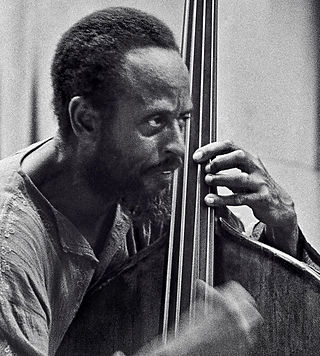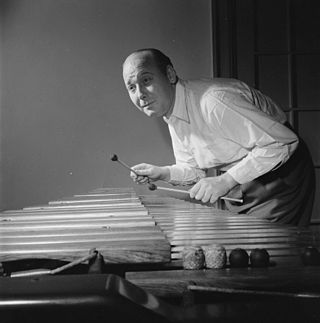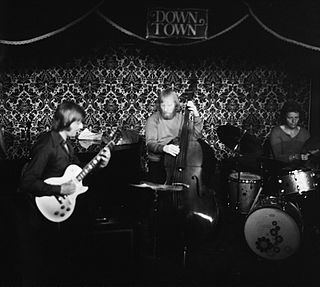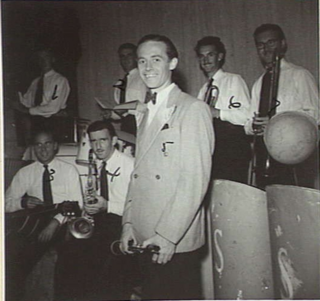Gallery
- The Pat Caplice Trio in 1954. From left, Jan Gold, guitar; Ken McClure, bass; and Pat Caplice, vibraphone.
Patrick "Pat" Caplice (born 4 April 4 1927, Sydney) [1] is an Australian jazz musician (drums and vibraphone). [2]
Caplice studied harmony at the New South Wales Conservatorium of Music between 1952 - 1955, [3] and during that time his groups The Pat Caplice Ensemble and Pat Caplice Quintet performed on the ABC's 2FC-NA radio stations. [4] [5] Caplice performed with The Art Ray Quintet who released their album 'Midnight Melodies' in 1952. [6] [7]
Caplice led several of his own groups. In 1954, The Pat Caplice Trio consisted of Jan Gold (guitar), Ken McClure (bass), and Caplice (vibraphone), and appeared on ABC radio. [8] Caplice also worked with Jan Gold in The Pat Caplice Ensemble, alongside John Morrow (bass), Ken Hardy (bass clarinet), Peter Richardson (flute), and Don Osborne (drums). The Ensemble released their first recording 'Mood Modern' in February 1957, [3] and in their review The Sydney Morning Herald called The Ensemble, "one of the few Australian avant garde jazz groups, is reminiscent of the brilliant Swedish modernists more than the American school." [9]
The Pat Caplice Trio continued to perform at clubs in Sydney, and were noted for their experimentation in jazz instrumentation. [10] In 1958, the trio expanded to include Mal Cunningham on flute and recorded as The Pat Caplice Quartet. Released by Columbia Records as 'Caprice: Adventures In Sound With Pat Caplice', the album was credited as the "first 12-inch long-playing record made by an Australian jazz band." [10] ABC Weekly praised the album for displaying "the latest trends in jazz", and Caplice's ability to provide an atmosphere for his musicians to play their best. [11]
Although Caplice's records were reviewed favourably and sold well at the time, his band didn't receive enough work and disbanded. [12] [2]
During the mid-1950s, Caplice briefly worked at Sydney's 2UW as a panel operator before returning to music. [3] He also recorded as part of the Music Maker 1957 All-Stars, which also featured Freddy Logan, Don Burrows, and others voted Australia's best jazz musicians at the time. [2]

Oscar Pettiford was an American jazz double bassist and composer. He was one of the earliest musicians to work in the bebop idiom.

Callen Radcliffe Tjader Jr. was an American Latin Jazz musician, often described as the most successful non-Latino Latin musician. He explored other jazz idioms, especially small group modern jazz, even as he continued to perform music of Africa, the Caribbean and Latin America.

Kenneth Clarke Spearman, known professionally as Kenny Clarke and nicknamed Klook, was an American jazz drummer and bandleader. A major innovator of the bebop style of drumming, he pioneered the use of the ride cymbal to keep time rather than the hi-hat, along with the use of the bass drum for irregular accents.

Percy Heath was an American jazz bassist, brother of saxophonist Jimmy Heath and drummer Albert Heath, with whom he formed the Heath Brothers in 1975. Heath played with the Modern Jazz Quartet throughout their long history and also worked with Miles Davis, Dizzy Gillespie, Charlie Parker, Wes Montgomery, Thelonious Monk and Lee Konitz.

Red Norvo was an American musician, one of jazz's early vibraphonists, known as "Mr. Swing". He helped establish the xylophone, marimba, and vibraphone as jazz instruments. His recordings included "Dance of the Octopus", "Bughouse", "Knockin' on Wood", "Congo Blues", and "Hole in the Wall".

Sir George Albert Shearing was a British jazz pianist who for many years led a popular jazz group that recorded for Discovery Records, MGM Records and Capitol Records. Shearing was the composer of over 300 songs, including the jazz standards "Lullaby of Birdland" and "Conception", and had multiple albums on the Billboard charts during the 1950s, 1960s, 1980s and 1990s.

George Wallington was an American jazz pianist and composer. Born in Sicily, his career as a pianist began in the early 1940s, when he played with Dizzy Gillespie and Charlie Parker and contributed to the development of bebop. Following several years as a sideman during the late 1940s, he formed his own group, experimenting with trios and a string ensemble before settling upon a permanent quintet.

Jazz music has a long history in Australia. Over the years jazz has held a high-profile at local clubs, festivals and other music venues and a vast number of recordings have been produced by Australian jazz musicians, many of whom have gone on to gain a high profile in the international jazz arena.

Ronnie Scott OBE was a British jazz tenor saxophonist and jazz club owner. He co-founded Ronnie Scott's Jazz Club in London's Soho district, one of the world's most popular jazz clubs, in 1959.

Keith Moore "Red" Mitchell was an American jazz double-bassist, composer, lyricist, and poet.
Andrew Ford is an English-born Australian composer, writer, and radio presenter, known for The Music Show on ABC Radio National.
John Joseph "Jack" Brokensha was an Australian-born American jazz vibraphonist, known for his work with the Australian Jazz Quartet and Motown Records.

Horace Andrew Dargie was an Australian musician, television compère, talent manager, music label founder and music arranger. As a member of Horrie Dargie Quintet he was awarded the first gold record in Australia for their 10-inch live album, Horrie Dargie Concert (1952), which sold 75,000 copies. In the late 1950s and early 1960s he compèred TV variety programmes Personally Yours (1959), BP Super Show (1959–1962) and The Delo and Daly Show (1963–1964). Dargie co-produced teen pop music programme, The Go!! Show (1964–1967), and as well as organising its on-screen performers he established the related Go!! Records label to provide an outlet for artists' singles. He was inducted into the ARIA Hall of Fame in 1996. Dargie was married twice.
"Bags' Groove" is a jazz composition by Milt Jackson. It was first recorded by the Milt Jackson Quintet on April 7, 1952 for Blue Note Records, later released on Wizard of the Vibes. Lou Donaldson, John Lewis, Percy Heath and Kenny Clarke were on that date. Next was the Mat Mathews quintet with Herbie Mann, Bud Powell, Mat Mathews again, a bootleg version by the Modern Jazz Quartet, the Lighthouse All-Stars, bassist Buddy Banks' quartet and then Jay Jay Johnson and Kai Winding. Other important recordings include those by Ray Bryant, Oscar Peterson, Al Haig, George Russell, and Mal Waldron.
The Australian Jazz Quartet (AJQ), also known as the Australian Jazz Quintet, was a jazz group active in the 1950s, best known for collaborations with Dave Brubeck, Gerry Mulligan and Carmen McRae.

The Esso Australian Jazz Summit is a live compilation album of jazz music recorded live at the Bondi Beach. The album was nominated for 1987 ARIA Award for Best Jazz Album.
Robert Graeme Barnard was an Australian trumpet and cornet player. He was nominated at the ARIA Music Awards of 1996 for Best Jazz Album for Live at the Sydney Opera House, which was recorded with the Australian Jazz Allstars.
AtmaSphere is an Australian jazz ensemble formed and led by drummer David Jones.
Frederick "Freddy" Logan (1930–2003) was a Jazz musician.
The Port Jackson Jazz Band were an Australian Dixieland jazz group formed in 1944 and based in Sydney. They were the longest running traditional jazz band in Australia and performed into the 1990s, though they had multiple breakups.
{{cite book}}: CS1 maint: multiple names: authors list (link){{cite book}}: CS1 maint: location missing publisher (link)Pat Caplice discography at Discogs